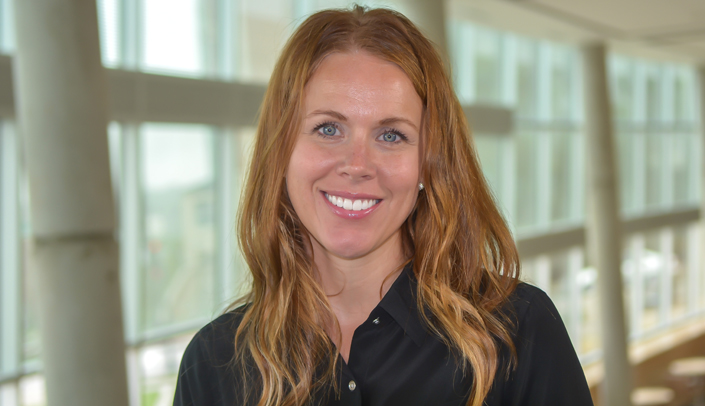This fall, the Munroe-Meyer Institute Department of Psychology will begin a new collaboration with V.J. and Angela Skutt Catholic High School in Omaha, integrating behavioral health services into the school.
The collaboration arose from a conversation between Skutt Catholic President Jeremy Moore and Jennifer Burt, Ph.D., assistant professor of psychology and parent of a Skutt student.
SAMHSA grant
The Skutt Catholic collaboration will be drawing on resources available through the Mid-American Mental Health Technology & Transfer Grant, a Substance Abuse and Mental Health Services Administration grant received by the Behavioral Health Center of Nebraska (BHECN).
“He wanted to talk about school-based mental health and establish additional supports for students at Skutt Catholic,” Dr. Burt said. “Mr. Moore was committed to addressing the behavioral and mental health needs of the students at Skutt. He was committed to making sure that the support extended beyond individual therapy and will impact the whole school. MMI was a natural partner with our experience contracting with OPS and establishing school-based mental health in Millard Public Schools.”
Mental health issues are common among today’s school-aged children and youth, with an estimated one in five children under the age of 18 having a diagnosable mental health disorder. Although most mental disorders can be managed with appropriate treatment, the majority of children needing services — an estimated 75% to 80% — do not receive them.
Moore announced the collaboration to the Skutt Catholic community in a July email, welcoming MMI psychology fellow Natalie Hoff, Ph.D. As Skutt Catholic’s integrated behavioral specialist, Dr. Hoff will be responsible for working with the school’s professionals to develop comprehensive behavioral health supports, including providing individual therapy to students in coordination with educators and guidance professionals in the school.
“Dr. Hoff is trained as a school psychologist and came to MMI with a strong foundation in evidenced-based behavioral health services in schools,” Dr. Burt said. “She proved herself as a doctoral intern at MMI as someone committed to both providing high quality services and developing strong relationships with youth, families, referring providers and peers. Dr. Hoff is a great leader. We were looking for someone who had the initiative, leadership skills and ability to really form partnerships in a school setting, in addition to being a very strong clinician.”
From President Moore
“Our goals for integrating behavioral health into our school is to provide universal supports for all students, as well as a convenient, accessible and familiar environment for students who may benefit from individual and/or family therapy. Strong mental health and well-being is critical to the success of students both in and outside of school. Research demonstrates that students who receive behavioral health support achieve better academically, while also improving the overall school culture, classroom behavior, on-task learning, and a sense of connectedness and well-being.”
MMI will provide support using a three-tiered model popular in schools, Dr. Burt said. The model includes a continuum of mental health services to students and their families to increase access to needed mental health services, promote earlier identification of and intervention for mental health needs, and foster collaboration between mental health providers, school systems, and other community stakeholders.
In his letter announcing the collaboration, Moore highlighted these supports, as well:
- Developing a screening, identification and referral program for youth exhibiting difficulties with behavioral health and/or learning needs;
- Developing a wellness curriculum to integrate into classrooms to promote healthy coping strategies for all youth in the school; and
- Providing ongoing support and educational trainings to faculty and parents on behavioral health topics affecting adolescents.
“This program will enhance the Skutt Catholic school counseling program by providing an onsite behavioral health specialist who can provide individualized counseling/therapy services to students who have mental health issues that require support beyond what a school counselor would provide,” Moore said in his letter.
School counselors will be integral to the collaboration, Dr. Burt said.
“The school counselors at Skutt are very involved with all students, meeting with them individually at least twice per year to build relationships and provide ongoing academic and college counseling services. They are the most trusted resource for students and families in difficult situations and are well-trained to provide support for students in crisis situations. The addition of Dr. Hoff to the school team will allow guidance counselors to refer students who may need more ongoing support to a trusted resource in the school setting,” she said.
Dr. Burt and Dr. Hoff have met with Skutt Catholic’s director of guidance, Kristen Reeves, to establish collaborative goals for developing comprehensive behavioral health supports at the school. Initial goals include developing a system for individual and family-based therapy and to pilot a screening program. School-based screening will assist counselors to identify students who may benefit from additional support. Future goals also will include integrating behavioral health and healthy coping into school curricula.
“Skutt Catholic is recognizing the need to help all kids reach their potential and that there are barriers to accessing counseling services in the community,” Dr. Burt said. “Skutt Catholic was interested in eliminating that barrier — they’re contracting with us, so they’re providing these services at no additional cost to families. They’re committed to making sure that students at Skutt have the support that they need to be successful academically and in life. Skutt Catholic also wants its teachers to have the support they need to recognize and support healthy coping in the classroom.”
